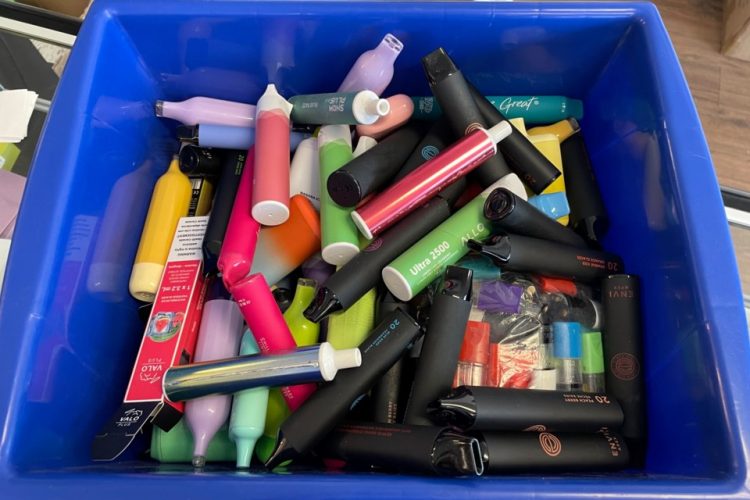The surge in e-cigarette consumption and the negative effects of nicotine waste on the environment
According to a report from a survey that was conducted by Eden Suh/Sunbury.com, 51% (over half) of young electronic cigarette consumers empty their disposables or throw their e-cigarette pods in the bins and 49.1% (nearly half) of young vapers are clueless about how to handle the disposable products and e-cigarette pods.
The rapidly growing vaping sector comes with the worry of how to dispose of e-cigarettes. Do consumers know how or where to throw away a used disposable vape or pod given that e-cigarette manufacturing businesses don’t explicitly market or reveal how to dispose of vapes and pods?
A survey report from the Truth Initiative indicates that 51% (over half) of young e-cigarette consumers reported throwing away empty disposables or e-cigarettes pods in the bins and 49.1% (about half) of young vaping enthusiasts do not have an idea of how to deal with disposable devices and used electronic cigarette pods.
The environmental effects of vape disposals might be disregarded in this case, especially in light of the current cultural phenomena that have emerged around vaping.
Statistics show that e-cigarette sales in Canada have nearly tripled in value since 2014, indicating that e-cigarette use has been a flourishing industry since the onset of the 2010s. In 2022, revenue from vape sales will be $1.26 billion, up from $.47 billion in 2014. On a global level, Canada is also the third-highest revenue generator in the e-cigarette industry.
And despite regulations on the sale of e-cigarettes containing nicotine in Canada, a study conducted by the School of Public Health & Health Systems, University of Waterloo, Ontario, shows that there is a rise in the number of smokers as well as non-smokers trying e-cigarettes, with the proportion of non-smokers trying electronic cigarettes almost doubling according to a survey conducted in Canada in 2012.
Millions of disposable vapes that include materials like lithium, which is frequently used in batteries, are finding their way into landfills as a result of the rise in vaping consumerism.
The same lithium-ion batteries used in an electric car and phone batteries are frequently utilized in vaporizers. And when you get rid of them as non-reusable or single use, it becomes trash that could have been recycled into EV or phone batteries.
Vape items not only damage the environment when they are discarded without being recycled, but it is also wasteful.
According to research by Yogi Hendlin, an environmental philosopher, “lithium-ion batteries, electronic circuit boards, and hard plastics require dismantling, sorting, as well as additional disposal and recycling. High concentrations of nicotine and e-waste residuals create biohazard concerns. Broken gadgets can release heavy metals (such as lead, bromines, and mercury), nicotine, and battery acid into the neighborhood and urban environment when they are left lying around or incorrectly disposed of, having an impact on people and other living things.”
In its research, The Truth Initiative recommended holding e-cigarette makers accountable and establishing a consistent procedure for discarding e-cigarette devices, e-liquids, and refills.
In Sudbury, one vape shop has already started a program to collect and promote the recycling of e-cigarette pods and disposable vape. The North 49 Vape Store in Sudbury started its vape recycling program about 18 months ago when the manager became aware of the trash created by purchasing and using disposable vapes.
Greg Steele, manager of the vape shop, stated that he was weary of scooping up pods and disposables from the parking lot and seeing people perceive them as the new version of cigarette butts. “We came up with this program where people can bring in their disposables and throw them in the recycling bin and we have little tabs so they can fill out their name and phone number,” Steele added.
Then, those who drop off their used pods and disposable vapes can join a weekly drawing at the vape shop for a chance to win prizes.
Steel also stated that they were offering them reusable items such as hats, t-shirts, and other items that have less negative implications for the environment compared to disposables.
The retailer then brings them to the city’s hazardous waste management facility or a Sudbury battery recycling company, where they will be professionally and safely disassembled and recycled.
“What I really want to accomplish is to get people to stop throwing disposables or pods on the ground. I’d like to give them incentives to bring them back (to the store),” Steele said.
Vapes and pods can be delivered to North 49 for proper recycling and disposal, but there are alternative ways to discard e-cigarettes securely. The city’s Household Hazardous Waste Depot, located at 1853 Frobisher Street, accepts them for recycling. E-cigarettes are currently being included in the city’s Waste Wise App, which instructs users on how to properly dispose of various sorts of waste. This was confirmed by the city through email.
If properly and safely handled, they can as well be disposed of at home. Sudbury.com advises viewers to use proper safety precautions and wear protective gear when removing batteries because it might be risky. Consult a specialist if you’re unsure. Visit this page to view a TikTok instructional from Sudbury.com on how to recycle e-cigarettes at home. Here is the reference video from which this brief tutorial was sourced.







